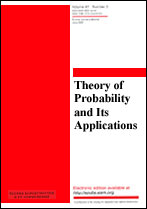|
This article is cited in 3 scientific papers (total in 3 papers)
Random time-changed extremal processes
E. I. Panchevaa, E. T. Kolkovskab, P. K. Jordanovac
a Institute of Mathematics and Informatics, Bulgarian Academy of Sciences
b Center for Mathematical Research
c Konstantin Preslavsky University of Shumen
Abstract:
The point process $\mathcal N=\{(T_k,X_k):k\ge 1\}$ we deal with here is an assumed Bernoulli point process with independent random vectors $X_k$ in $[0,\infty)^d$ and with random time points $T_k$ in $[0,\infty)$, independent of $X$. For normalizing we use a regular sequence $\xi_n(t,x) =(\tau_n(t),u_n(x))$ of time-space changes of $[0,\infty)^{1+d}$. We consider the sequence of the associated extremal processes, $\widetilde{Y}_n(t)=\{\bigvee u^{-1}_n(X_k):T_k\le\tau_n(t)\}$, where the max-operation "$\vee$" is defined in $\mathbf R^d$ componentwise. We assume further that there exist a stochastically continuous time process $\theta=\{\theta(t):t\ge 0\}$, strictly increasing and independent of $\{X_k\}$, and an integer-valued deterministic counting function $k$ on $[0,\infty)$, so that the counting process $N$ of $\mathcal N$ has the form $N(s)=k(\theta(s))$ a.s. In this framework we prove a functional transfer theorem which claims in general that if $\tau_n^{-1}\circ\theta\circ\tau_n\Rightarrow\Lambda$, where $\Lambda$ is strictly increasing and stochastically continuous, and if $\bigvee_{k=1}^{k(\tau_n(\cdot))}u^{-1}_n (X_k)\Rightarrow Y(\cdot)$, then $\widetilde{Y}_n\rightarrow\widetilde{Y}=Y\circ\Lambda$, where $Y$ is a self-similar extremal process. We call such limit processes random time-changed, or compound. They are stochastically continuous and self-similar with respect to the same one-parameter norming group as $Y$. We show that the compound process is an extremal process (i.e., a process with independent max-increments) if and only if $\Lambda$ has independent increments and $Y$ has homogeneous max-increments. We apply random time-changed extremal processes to find a lower bound for the ruin probability in an insurance model associated with $\mathcal N$. We give also an upper bound using an $\alpha$-stable Lévy motion.
Keywords:
extremal processes, weak limit theorems, ruin probability.
Received: 11.08.2003
Revised: 15.04.2005
Citation:
E. I. Pancheva, E. T. Kolkovska, P. K. Jordanova, “Random time-changed extremal processes”, Teor. Veroyatnost. i Primenen., 51:4 (2006), 752–772; Theory Probab. Appl., 51:4 (2007), 645–662
Linking options:
https://www.mathnet.ru/eng/tvp23https://doi.org/10.4213/tvp23 https://www.mathnet.ru/eng/tvp/v51/i4/p752
|


|




 Contact us:
Contact us: Terms of Use
Terms of Use
 Registration to the website
Registration to the website Logotypes
Logotypes








 Citation in format
Citation in format 
